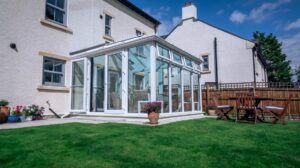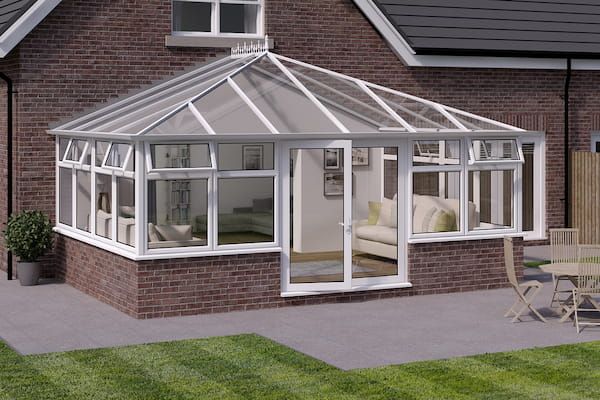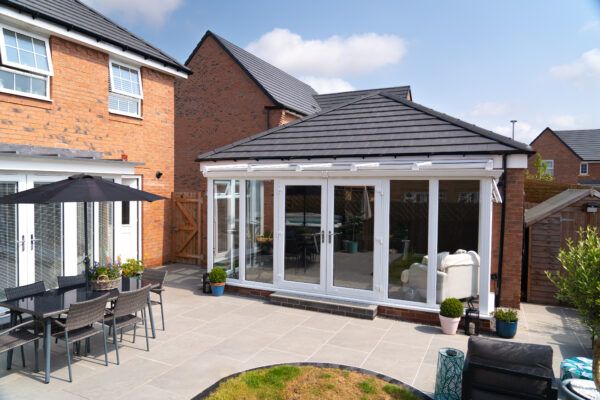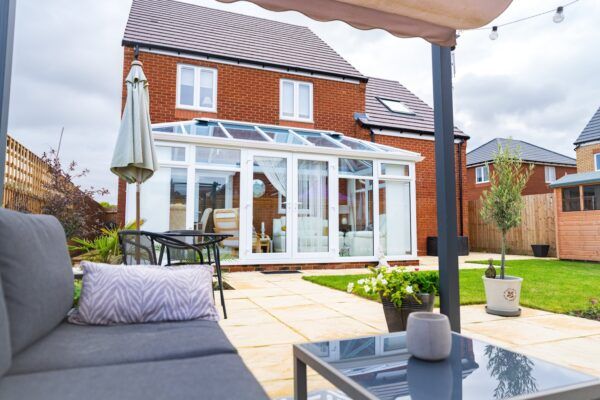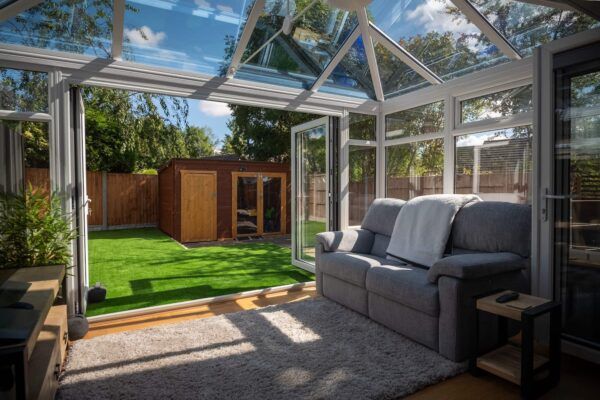When looking to increase your living space, you may be wondering whether a conservatory or a conventional extension is the better choice.
Both types have pros and cons, but it’s your preferences, budget and lifestyle that ultimately determine which will be best for you.
To help, we’ve compared conservatories and traditional extensions below, discussing the benefits, costs and suitability.
What is the difference between a conservatory and an extension?
One of the main distinctions between a conservatory and an extension is how they are built.
A conservatory is usually a predominantly glass structure attached to the side of the home, with a glass or polycarbonate roof. Conservatories create a light-filled space that can be used for various purposes, such as a dining room, kitchen or home office.
An extension is typically constructed of similar materials as the existing building to create a seamless appearance, including a solid roof and walls. Materials are usually chosen based on structural and insulation needs, as well as your budget and design preferences. An extension, like a conservatory, can be used for many purposes, such as expanding your dining room and kitchen or adding an extra bedroom.
Although a conservatory and traditional extension differ in their construction and design, they both serve to expand your living area, providing a comfortable and enjoyable space for you to enjoy.
Conservatory vs extension: side-by-side comparison
| Feature | Conservatory | Traditional extension |
| Construction materials | Mostly glass or polycarbonate walls and roof | Same materials as existing home with solid roof and walls |
| Natural light | Very high, due to glass structure | Lower roof due to solid walls and roof |
| Insulation | Lighter insulation with increased natural light from additional windows | Well-insulated, matching home |
| Planning permission | Usually not required, but learn more here | Often required, depending on size and design |
| Use | Ideal for light, airy spaces such as dining rooms, offices or lounges | Suitable for all uses, including bedrooms, kitchen and bathrooms |
| Build time | Shorter, modular build | Longer due to more extensive construction |
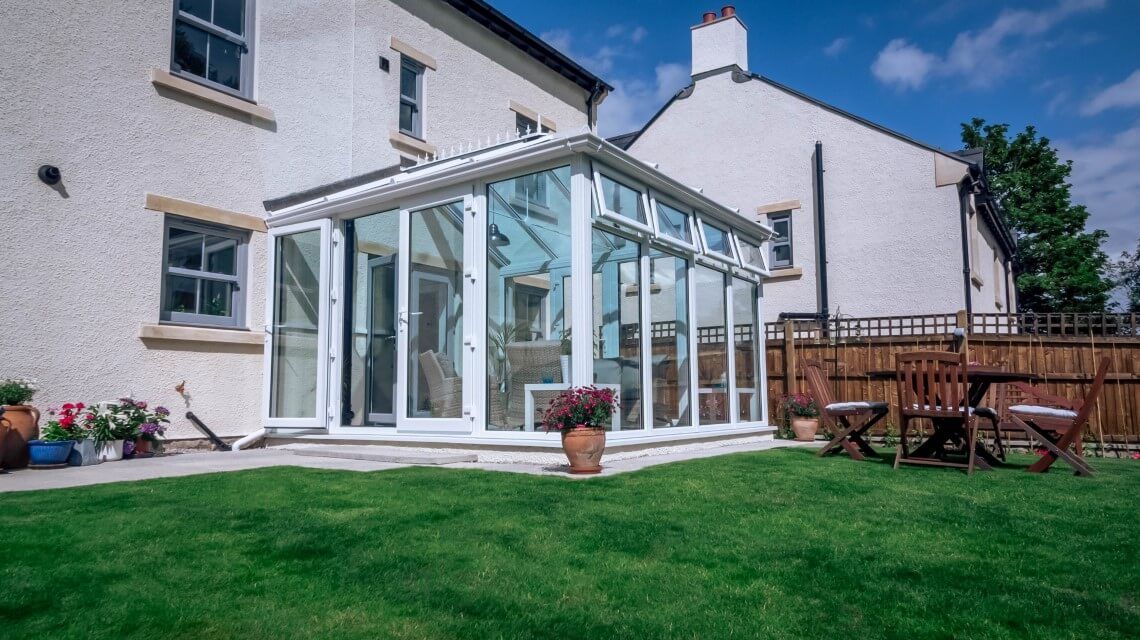
The pros and cons of a traditional extension
Traditional extensions offer several advantages, including:
- Add more living space to your home — if you want to add an extra bedroom or extend your kitchen.
- Create a new room in any size, whether it’s a one-storey or two-storey extension – meaning you won’t need to move.
- Stay just as warm as the rest of the home in any weather.
- Increase the value of your home.
- Seamless design with your home.
There are some disadvantages of a traditional extension, such as:
- More expensive to build.
- More disruptive due to the lengthy construction process, and you might run into unexpected costs.
- You need Building Regulations approval, and Planning Permission may be required – depending on the dimensions.
- Provides less natural light than a conservatory because of the solid roof and walls.
- Can be stressful.
The pros and cons of a conservatory extension
There are plenty of advantages to choosing a conservatory:
- Easier to install than a traditional extension — modular sections are ideal for both professional and DIY assembly.
- Quick and clean — a modular base means the building work is less disruptive and messy than a conventional extension.
- A cost-effective way to increase your living space and natural light in your home.
- Custom-made based on your preferences and specifications — you can choose the size and shape that complements your home.
- Planning permission is not required, provided the build meets the applicable conditions.
- Adds value to your home.
Here are some disadvantages to consider:
- Some styles and sizes are more expensive to heat than an extension.
- Older conservatories may face issues with temperature regulation.
- Usually won’t add as much value as a traditional extension.
- Not suitable for some purposes, like a bathroom.
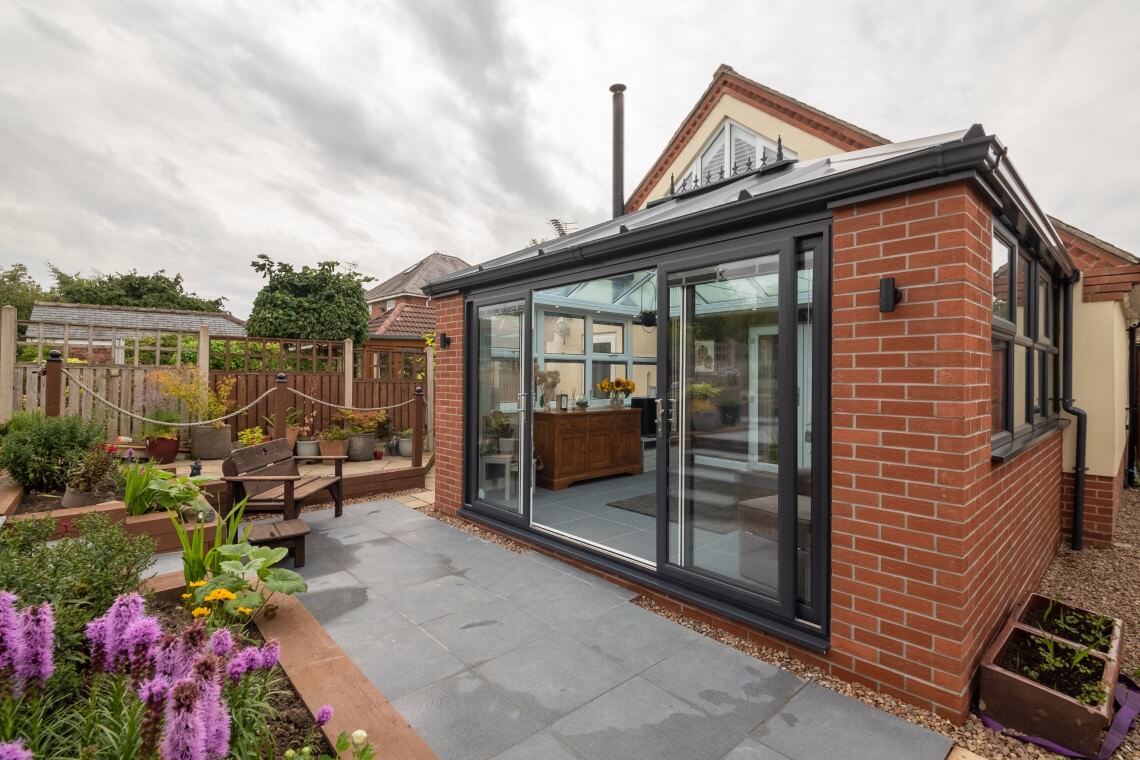
When does a conservatory officially become an extension?
In most cases, a conservatory is classed as a permitted development. This means you can usually build one without planning permission, provided it meets applicable limits and conditions. An example of this is taking up only 50% of the total area of the property.
But the line between a conservatory and extension becomes blurred when changes are made to its structure or how it connects to the main house. Your conservatory may be classified as an extension if:
- It exceeds the size limits permitted without planning permission.
- It features a solid roof, instead of a glass or polycarbonate one.
- You remove the external doors or walls that separate it from your home, creating an open-plan layout.
- It doesn’t meet certain building regulations, such as insulation or structural stability.
In these cases, planning permission may be needed, and the structure would be treated as a traditional extension.
Is it cheaper to have a traditional extension or a conservatory?
Traditional extensions vary in price depending on several factors, like their size and construction materials.
Overall, they are typically more expensive than conservatories because they can involve architecture fees, skip hire and the costs of adding a new opening to your home.
The labour may also be more expensive, as extensions usually take longer to build than conservatories.
How to add a conservatory extension to your home
While a conservatory extension differs from a traditional extension in many ways, you can design it to look like a natural extension of your home, just like a conventional extension.
Let’s look at ways you can seamlessly integrate your conservatory with your home:
- Privacy panels add an aesthetic appeal while increasing privacy.
- Full-Height and Dwarf Walls with a brick finish that closely matches your property provide extra insulation.
- Modern sliding doors or bi-fold doors increase ventilation and maximise natural light entering the space.
- A solar control glass roof helps maintain comfortable temperatures all year round.
Ready to create your extension? Build your dream conservatory with our quote engine, and view your digital design in just a few minutes.
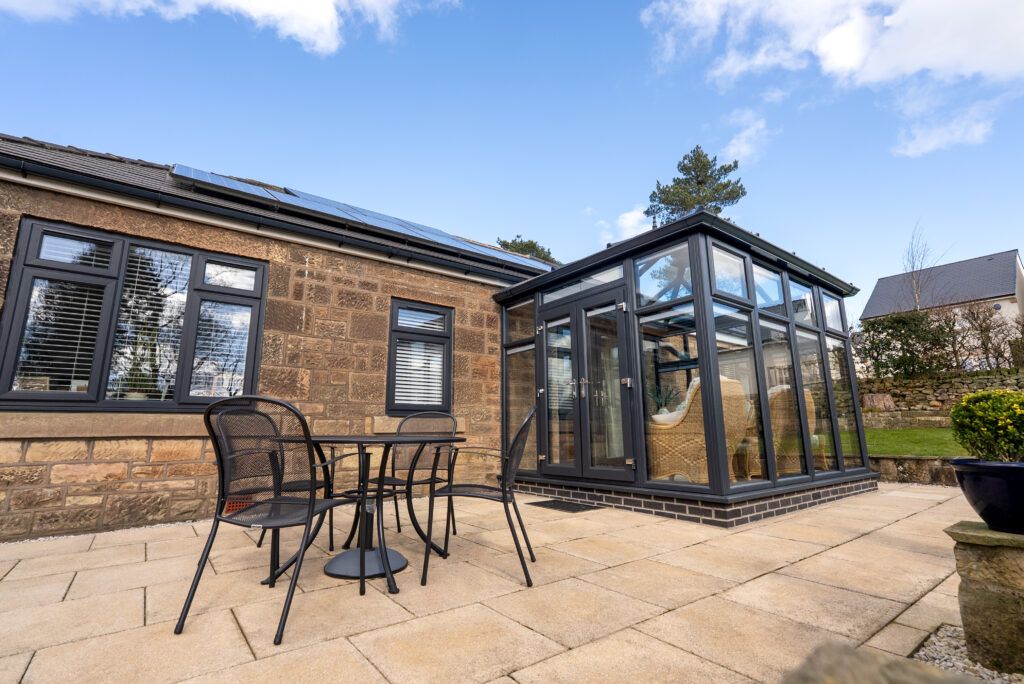
Which is right for you?
Now that we’ve looked at the differences, the choice between a conservatory vs extension comes down to which option best suits you and your home, lifestyle and budget.
If you’re working to a tighter budget, a conservatory is a cost-effective way to extend your home and add more space. The installation is often quicker and less disruptive, especially when using our ConservaBase.
Extensions, though, can offer more flexibility in terms of size and layout, but this means they’re usually more expensive and complex. You’ll need to get approval and several tradespeople involved, too.
Our conservatories are easily customisable using our conservatory configurator tool, showing you the wide range of styles, colours and door options you have available. Plus, they all come with a 10-year guarantee covering our ConservaBase, frames and roofs with the uPVC components protected against discolouration, warping and cracking.
FAQs
How much can I extend my house?
There are several rules to follow if you want to add a conservatory to your home without getting planning permission.
A single-storey rear conservatory can extend beyond the back wall of your home up to eight metres for a detached house and six metres for terraced or semi-detached properties. If built on the side of your home, it shouldn’t exceed four metres in height or a width of more than half of the original house.
Find out more about conservatory planning permission.
Not all extensions require planning permission, and some may be granted permitted development rights. Contact your local authority for more information.
How long does an extension take?
We estimate that an Edwardian conservatory with our all-in-one ConservaBase system will take four to six days to complete.
However, conservatory build times vary depending on several factors, including its size and style, weather conditions and the installer’s experience. Traditional extensions usually take longer to build than a conservatory.
For more information, check out our guide on estimated conservatory build times.
How much does it cost to extend a house?
The cost of extending a house varies depending on the extension’s size and style, as well as other factors.
Typically, a traditional extension is more expensive than a conservatory because they involve more costs, such as architect fees and skip hire.
For more details, check out our conservatory price guide.
Do you need foundations for a glass conservatory extension?
Yes, a glass conservatory extension will usually require foundations.
Like conventional extensions, conservatories are only as sturdy as their foundations and stable ground is necessary to ensure the durability of the structure.
For more information, visit our guide to conservatory foundations.
Explore house extension ideas with ConservatoryLand
An extension is a significant home improvement, so you should invest in a build that suits your budget and needs.
With our quote engine, you can easily visualise your conservatory project online, helping you to make an informed decision.
Experiment with different styles and customisation options, like privacy walls and dwarf walls, to create a custom design that perfectly matches your preferences and vision.
Try our conservatory configurator tool here.
Disclaimer
Please note that the information provided on this page is not legal advice. It is given as a guide only, based on the information outlined at planningportal.co.uk.
The guidance described on this page applies to houses, not flats, maisonettes or other buildings. Other consents may also be required if your home is listed or in a designated area.
The information was correct at the time of publication, but it is subject to change as a result of legislative changes. Before beginning any work, always seek advice from local planning authorities.
